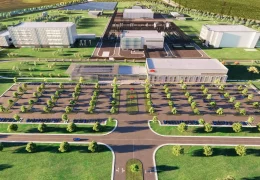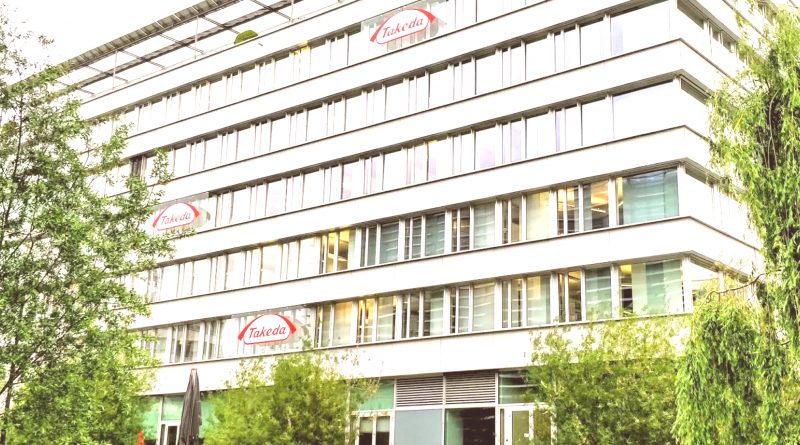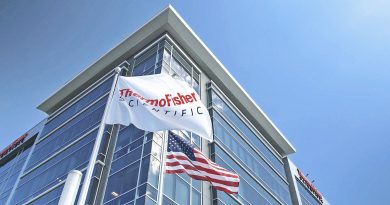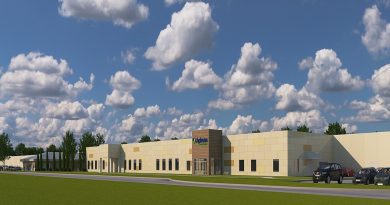Dengue Vaccine Manufacturing Plant, Takeda, Singen
The Dengue Vaccine Manufacturing Plant was opened in Singen, Germany by Takeda in November 2019. The new vaccine manufacturing plant is set-up for the production of Takeda’s dengue vaccine candidate, TAK-003.
Dengue Vaccine Manufacturing Plant to further Takeda’s global reach
The plant’s landmark ceremony took place in 2016. Takeda will spend over € 130 million ($145 million) in the cutting edge facility, creating over 200 jobs. It is anticipated that the plant will broaden Takeda’s worldwide presence in vaccine production beyond Japan, thus allowing the company to tackle the widespread dengue threat.
The plant will produce the TAK-003 vaccine formulation, fill-and-finish and packaging. This production utilises a significant amount of automation processes and innovative digital and data-driven technology.
The fastest spreading mosquito-borne viral disease
Dengue, which is transmitted most commonly by Aedes aegypti mosquitoes is known as endemic in more than 120 countries. Dengue is now the fastest spreading mosquito-borne viral disease in the world and by far surpasses malaria. The World Health Organization (WHO) reports that around 390 million dengue infections and 20,000 deaths occur around the world each year.
Dengue vaccine manufacturing
Due to the availability of an experienced workforce in lyophilisation technology, pivotal for the manufacturing of the TAK-003 vaccine, the city of Singen in Germany was selected as the best geographical location for Takeda’s dengue vaccine manufacturing plant.
The data-driven manufacturing system allows the plant’s output to be tracked in real-time, offering higher quality control.
TAK-003, which is being tested in a three-stage pivotal trial, Tetravalent Immunization against Dengue Efficacy Study (TIDES), will be manufactured and packaged from start to finish at the new plant.
The vaccine is being formulated to safeguard children and adults living or travelling to endemic regions from all four dengue virus stereotypes independent of previous exposure to dengue.
TAK-003 vaccine development
TAK-003 is a Takeda-developed tetravalent dengue vaccine. It is a live-attenuated dengue serotype two virus (DENV-2), the genetic core for all four vaccine virus stereotypes, including DEN-1, DEN-2, DEN-3 and DEN-4.
In phase one and two trials, the drug showed its efficiency in producing an immune response and was safe and well-tolerated.
The multi-center, international, double-blind, and randomised placebo-controlled TIDES study is being performed to determine TAK-003’s safety, effectiveness, and immunogenicity in healthy children living in Latin America and Asia’s dengue-endemic countries.
Over 20,000 healthy children between the ages of four and 16 were enrolled in the clinical trial.
The initial trial results, announced in January 2019, revealed that the primary endpoint was met by the experiment. The medication has been effective in preventing dengue caused by all of the four stereotypes of the virus.
Dengue vaccine candidate Phase 3 TIDES trial
More data from the pivotal Phase 3 clinical trial was released by Takeda in November 2019 at the American Society of Tropical Medicine and Hygiene (ASTMH) 68th Annual Meeting. Data presented included an update on the overall efficacy of the vaccine candidate and a formal analyses of secondary efficacy endpoints by serotype, baseline serostatus and disease severity.
The dengue vaccine candidate was overall well-tolerated, and there have been no significant safety risks observed to date, consistent with previous findings.
The Phase 3 TIDES trial will continue to assess safety and efficacy of the Takeda’s vaccine candidate for a total of four and a half years. TAK-003 is at presently not licensed anywhere in the world.
More about Takeda Pharmaceuticals
Takeda Pharmaceuticals is a groundbreaking research and development-focused international biopharmaceutical company. The company was founded in 1781 and is headquartered in Tokyo, Japan.
Takeda’s research focuses primarily on four therapeutic fields of medicine, including oncology, neuroscience, rare diseases, and gastroenterology (GI).
Takeda’s continuous investment
Takeda has a prominent range of products and a pipeline including several experimental research drugs. Nesina (Alogliptin benzoate), Velcade (Bortezomib), Adcetris (Brentuximab vedotin), Colcrys (Colchicine) and Dexilant (Dexlansoprazole) are some of the products currently offered by Takeda. The company is also developing vaccines for Zika, norovirus and polio in addition to the TAK-003 dengue vaccine.
In January 2019, Takeda acqured Shire, a biopharmaceutical company with a focus on rare diseases and other highly specialised conditions, operating out of Jersey, US for more than $50 billion.
Advertisement
Latest Projects
- Eli Lilly to Invest $6 Billion in New API Manufacturing Facility in Alabama, USA
 The new Huntsville, Alabama site will produce small molecule and peptide medicines, including oral GLP-1 orforglipron Eli Lilly and Company
The new Huntsville, Alabama site will produce small molecule and peptide medicines, including oral GLP-1 orforglipron Eli Lilly and Company - Eli Lilly’s Next-gen $6.5B API and GLP-1 Orforglipron Facility, Houston, Texas, USA
 Eli Lilly and Company has announced plans to build a $6.5 billion next-generation active pharmaceutical ingredient (API) manufacturing facility at
Eli Lilly and Company has announced plans to build a $6.5 billion next-generation active pharmaceutical ingredient (API) manufacturing facility at - AstraZeneca Unveils $300 Million Cell Therapy Manufacturing Facility in Rockville, USA
 Global biopharmaceutical leader AstraZeneca has officially opened a new $300 million state-of-the-art cell therapy manufacturing facility in Rockville, Maryland, marking
Global biopharmaceutical leader AstraZeneca has officially opened a new $300 million state-of-the-art cell therapy manufacturing facility in Rockville, Maryland, marking - Roche to Invest $50B in US Pharma Expansion Set To Flip Trade Deficit
 In a transformative move for the U.S. healthcare manufacturing sector, Roche unveiled plans to invest $50 billion in American pharmaceutical
In a transformative move for the U.S. healthcare manufacturing sector, Roche unveiled plans to invest $50 billion in American pharmaceutical - MSD Acquires WuXi Vaccines Facility in Dundalk for €500m
 In a significant acquisition move, pharmaceutical giant MSD has agreed to acquire the WuXi Vaccines manufacturing facility in Dundalk, Ireland.
In a significant acquisition move, pharmaceutical giant MSD has agreed to acquire the WuXi Vaccines manufacturing facility in Dundalk, Ireland. - Infrareal to Take Over Takeda’s Gene and Cell Therapy Site in Orth, Austria
 Infrareal Holding plans to take over Takeda’s pharma and biotech site specialising in gene and cell therapies in Orth, Lower
Infrareal Holding plans to take over Takeda’s pharma and biotech site specialising in gene and cell therapies in Orth, Lower





